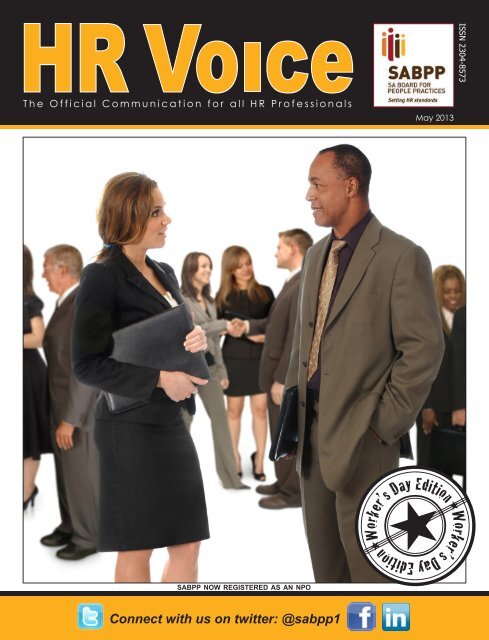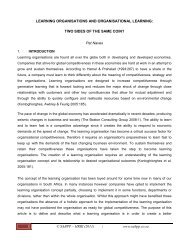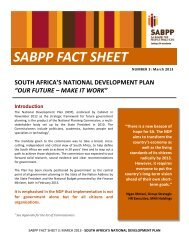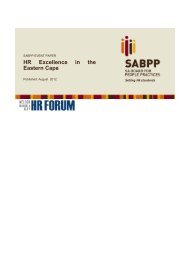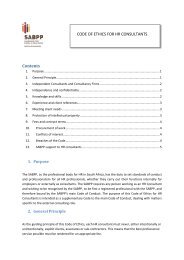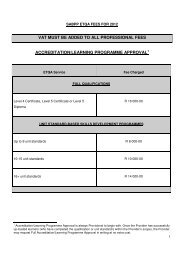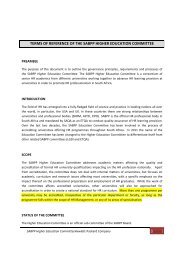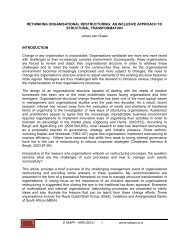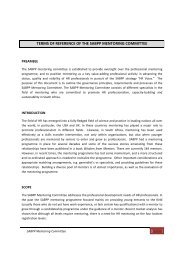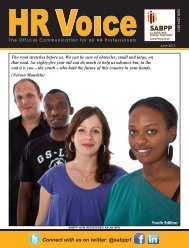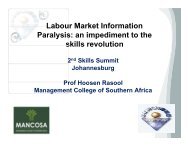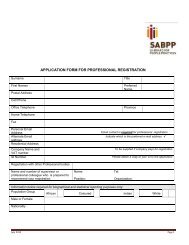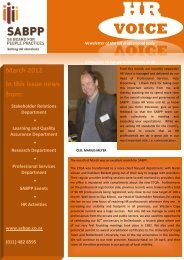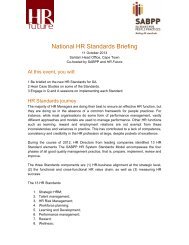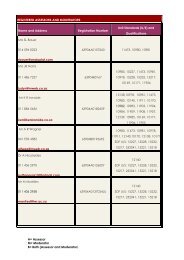May 2013.pdf - SABPP
May 2013.pdf - SABPP
May 2013.pdf - SABPP
Create successful ePaper yourself
Turn your PDF publications into a flip-book with our unique Google optimized e-Paper software.
HR o ce<br />
ISSN 2304-8573<br />
The Official Communication for all HR Professionals<br />
<strong>May</strong> 2013<br />
Worker’s Day Edition<br />
Worker’s Day Edition<br />
sabpp now registered as an npo<br />
Connect with us on twitter: @sabpp1
Inside:<br />
Contact us<br />
3 Board Desk A NEW ERA FOR<br />
• A New Era for HR:<br />
Setting HR standards for South Africa<br />
5 Stakeholder Relations<br />
• HR Internships<br />
• Open days In-house presentations<br />
• NPO Registration with Department<br />
of Social Development<br />
6 HRRI<br />
• Neuroscience and the Three Brains<br />
of Leadership<br />
• Book Review: Flourish<br />
• ASTD Annual Survey Report<br />
• Research into Bullying at Work<br />
• Training and Employment<br />
for People with Disabilities<br />
8 Professional Services<br />
• Workers’ Day 2013:<br />
A message from all <strong>SABPP</strong> workers<br />
• Registration matters<br />
• Advertising HR jobs<br />
• Mentoring committee<br />
• HR Standards Summit:<br />
21 MAY 2013<br />
• Global L&D Lessons For South Africa:<br />
23 <strong>May</strong> 2013<br />
• HR Business Partnering and Metrics<br />
Breakfast Session: Cape Town<br />
• Ethics Committee<br />
• Professional Registration Committee<br />
needs more members<br />
• New Professional Registration<br />
Certificates<br />
• How to Register as an HR<br />
Professional<br />
• <strong>SABPP</strong> Gauteng Committee Events<br />
on 4 and 14 June<br />
• Ethics Tip-Offs<br />
• Welcome to all student members<br />
12 Learning and Quality<br />
Assurance<br />
• The Power of Learnerships<br />
- Getting young people working<br />
2<br />
Learning & Quality Assurance<br />
Naren Vassan<br />
naren@sabpp.co.za<br />
Research<br />
Penny Abbott<br />
penny@sabpp.co.za<br />
Marketing & Stakeholder Relations<br />
Kenneth Nxumalo<br />
kenneth@sabpp.co.za<br />
Professional Services<br />
Sithembele Stofile<br />
sithembele@sabpp.co.za<br />
Professional Registrations<br />
Tshwarelo Mothopeng<br />
professional@sabpp.co.za<br />
Social media<br />
Jaco du Plessis<br />
voice@sabpp.co.za<br />
1st Floor,<br />
Rossouws Attorneys Building<br />
8 Sherborne Rd, Parktown<br />
PO Box 2450, Houghton, 2041<br />
South Africa<br />
T: +27 11 482 8595<br />
F: +27 11 482 4830<br />
Twitter: @<strong>SABPP</strong>1<br />
www.sabpp.co.za<br />
PUBLISHED BY<br />
BusinessBrief Publishing (Pty) Ltd<br />
57a Second Avenue,<br />
Inanda, Sandton<br />
T: (011) 788 0880 / F: (011) 788 2807<br />
PO Box 1546, Parklands,<br />
South Africa, 2121<br />
www.bbrief.co.za<br />
DESIGN<br />
Design Bandits / T: 083 460 3633<br />
www.designbandits.co.za<br />
ADVERTISING<br />
HR Consultants and providers who<br />
want to advertise their products<br />
and services in the HR Voice, should<br />
please contact James Scott from<br />
BusinessBrief on +27 11 788 0880 or<br />
james@bbrief.co.za<br />
EDITORIAL SUBMISSIONS<br />
Please send editorial submissions<br />
to Jaco du Plessis at<br />
voice@sabpp.co.za<br />
CONTRIBUTORS<br />
Siphiwe Moyo<br />
Janessa Leita
BOARD DESK<br />
A NEW ERA FOR HR: SETTING HR STANDARDS FOR SOUTH AFRICA<br />
Siphiwe Moyo,<br />
Chairman: <strong>SABPP</strong><br />
Welcome to the<br />
Workers’ Day edition<br />
of HR Voice. We<br />
celebrate worker rights<br />
and responsibilities.<br />
As you know, <strong>SABPP</strong><br />
has a new Board,<br />
and the new Board<br />
members have<br />
chartered a new era<br />
for HR in South Africa<br />
by launching a project<br />
to develop the first<br />
set of HR standards<br />
for South Africa.<br />
The purpose of the<br />
initiative is to lead and<br />
assist HR managers in generating integrated standards<br />
and metrics for the HR function aligned to business<br />
strategy. HR management system standards are needed<br />
to set a national benchmark of good practice and a<br />
consistent way of managing HR functions and people in<br />
organisations. HR metrics refer to tangible measures that<br />
show the impact of HR on the bottom-line of the business.<br />
Without a national set of standards, all current efforts at<br />
benchmarking and benchmarks are meaningless.<br />
Other professions like accounting and engineering<br />
have clear standards for professional practice, but the<br />
same cannot be said of HR. Accountants present their<br />
companies and clients with a consistent approach to the<br />
financial aspects of a company. They all conform to GAAP<br />
(Generally Accepted Accounting Practice) and this unified<br />
standards framework ensures consistency and credibility.<br />
For example, balance sheets and income statements are<br />
done in the same way, no matter the type of company<br />
or industry, and this consistent approach is prevalent<br />
throughout South Africa.<br />
However, there are many inconsistencies in the standard<br />
of HR work within organisations, between organisations,<br />
within and across sectors and nationally. These<br />
inconsistencies are based on a variance in standards<br />
at best, and the absence of standards at worst. This<br />
results in poor people management practices at most<br />
organisations costing them dearly, despite some pockets<br />
of excellence at leading companies. However, this will<br />
change with this national HR standards project.<br />
<strong>SABPP</strong> in association with HR Future and several other<br />
professional associations will generate HR functional<br />
standards (for example for workforce planning, learning,<br />
performance management), tangible HR metrics, as<br />
well as standards for integrated reporting. <strong>SABPP</strong> will<br />
drive this process and stay in close contact with the<br />
HR community in ensuring that they are involved in the<br />
generation of HR standards, as well as supporting them<br />
with the necessary capacity-building when applying these<br />
standards in practice. The HR Standards Project will kickoff<br />
on 21 <strong>May</strong> with 13 national standards being created for<br />
each one of the building blocks of the <strong>SABPP</strong> HR System<br />
Standards Model (see figure below).<br />
The <strong>SABPP</strong> HR System Standards Model encompasses<br />
the four phases of all good quality management practice,<br />
i.e. prepare, implement, review and improve. The three<br />
standards components are HR-business alignment at the<br />
strategic level, the functional and cross-functional HR<br />
value chain, as well as measuring HR success. Within<br />
these three standards components, the 13 HR standards<br />
are as follows:<br />
1. Strategic HRM<br />
2. Talent management<br />
3. HR Risk Management<br />
4. Workforce planning<br />
5. Learning & Development<br />
6. Performance management<br />
7. Reward<br />
8. Wellness<br />
9. Employment Relations Management<br />
10. Organisation Development<br />
11. HR Service Delivery<br />
12. HR Technology<br />
13. Measuring HR Success<br />
continued...<br />
3
BOARD DESK<br />
A NEW ERA FOR HR: SETTING HR STANDARDS FOR SOUTH AFRICA continued...<br />
The <strong>SABPP</strong> HR Standards and Metrics project will focus<br />
on the following three short-term phases:<br />
Phase 1 constitutes the development of the standards. A<br />
group of 130 HR directors will meet on 21 <strong>May</strong> to write the<br />
standards. This will be an interactive process culminating<br />
in a set of draft standards.<br />
Phase 2 consists of sharing the draft standards with the<br />
public and broader professional community for comments<br />
and inputs (June – July). These comments will be<br />
integrated to improve the draft standards.<br />
Phase 3 will be the highlight of the project when the<br />
standards will be released at South Africa’s first National<br />
HR Standards Conference. The final standards will be<br />
published into a standards book and presented at the<br />
conference from 20-22 August.<br />
As Chairperson of <strong>SABPP</strong>, I am very excited about this<br />
major milestone in the history of HR in South Africa. It<br />
is my vision that we should all collaborate in setting and<br />
raising the standard of HR work, irrespective of our area of<br />
specialisation. We ask the HR professional community to<br />
support this ground-breaking initiative by co-designing the<br />
first set of HR standards for the country. Moreover, once<br />
the standards are available we will all be implementers of<br />
the standards. The HR standards project will elevate HR<br />
to the level of other professions and provide a common<br />
platform for driving sound HR practice at all workplaces.<br />
Kindly support our alliance partner, HR Future, and <strong>SABPP</strong><br />
CEO Marius Meyer with this exciting project. We will use<br />
the winter season to generate the standards that will be<br />
available before spring, when a new season and new era<br />
for HR will emerge – a time for quality, consistency and<br />
excellence. We look forward to your involvement on this<br />
exciting journey.<br />
Siphiwe Moyo, Chairperson of <strong>SABPP</strong>, is also a<br />
motivational speaker and Senior Learning & Development<br />
Manager at Nedbank. HR Managers and Directors<br />
interested in the project can contact HR Future on<br />
alan@hrfuture.net or <strong>SABPP</strong> on marius@sabpp.co.za<br />
or follow them on twitter @<strong>SABPP</strong>1. More information<br />
about <strong>SABPP</strong> is available on www.sabpp.co.za.<br />
4
stakeholder relations<br />
During the last month <strong>SABPP</strong> interacted with dozens of stakeholders throughout<br />
South Africa. Not only were our skills development road-shows with SAQA and<br />
the QCTO a huge success, we also liaised with several other stakeholders such as<br />
learning providers, students, academics, alliance partners and HR managers.<br />
HR INTERNSHIPS<br />
Working with the National Youth<br />
Development Agency and HR Support<br />
Solutions, <strong>SABPP</strong> is proud to announce<br />
that the first pilot programme for HR<br />
Internships at Small Businesses has<br />
been launched. HR managers who are<br />
able to place HR interns can contact<br />
marjie@hrss.co.za. Likewise, HR<br />
students are also most welcome to<br />
submit their CVs to Margie.<br />
NPO REGISTRATION WITH<br />
DEPARTMENT OF SOCIAL<br />
DEVELOPMENT<br />
We are proud to announce that<br />
<strong>SABPP</strong> has been registered with the<br />
Department of Social Development as a<br />
Non-Profit Organisation in accordance<br />
with the NPO Act. Our registration<br />
number is 117-218 NPO.<br />
OPEN DAYS<br />
IN-HOUSE PRESENTATIONS<br />
The <strong>SABPP</strong> team members are<br />
available to visit your organisation<br />
to share progress with key projects,<br />
and to help HR teams to register as<br />
professionals in accordance with the<br />
NQF Act. Last month we visited a<br />
number of leading organisations such<br />
as MTN, Transnet, African Rainbow<br />
Minerals and the Department of Labour.<br />
To arrange a visit to your company,<br />
please contact Kenneth on<br />
kenneth@sabpp.co.za<br />
5
hrri<br />
Published by<br />
KNOWLEDGE RESOURCES<br />
Featured article from the latest edition<br />
of Human Capital Review http://www.<br />
humancapitalreview.org/content/<br />
NEUROSCIENCE AND<br />
THE THREE BRAINS OF<br />
LEADERSHIP<br />
The complex issues and adaptive<br />
challenges facing organisations today<br />
require a far more generative response<br />
than simply devising innovative strategies<br />
and new business models. New<br />
strategies, developed and executed from<br />
conditioned ways of being and thinking<br />
predictably, end up back in status<br />
quo. What is required is a new form<br />
of leadership. Not a new approach to<br />
leadership, but a new form.<br />
This new form is not about a particular<br />
leadership style or “type” of leadership.<br />
It’s about the leaders themselves and<br />
their ability to emerge new levels of<br />
consciousness and wisdom in their<br />
decision-making, write Grant Soosalu<br />
and Marvin Oka.<br />
Knowledge Resources has generously<br />
made a free subscription to this valuable<br />
on-line journal available to <strong>SABPP</strong><br />
registered professionals. Email<br />
hrri@sabpp.co.za to sign up.<br />
Professor Martin Seligman was in<br />
South Africa last November for the FNB<br />
Progress Conference on Happiness<br />
@ Work. The leader of the Positive<br />
Psychology movement and originator of<br />
the concept of Learned Helplessness,<br />
Dr Seligman is a prolific author in the<br />
field of self-improvement and positive<br />
psychology. In this latest book, he<br />
builds on his Authentic Happiness<br />
Theory and elaborates on how to<br />
achieve well-being and to flourish in<br />
life. He has, through the extensive<br />
academic research for which he<br />
is renowned, identified five pillars<br />
which together build well-being. The<br />
five pillars are: Positive Emotion;<br />
Engagement; Relationships; Meaning;<br />
and Accomplishments.<br />
None of these can be addressed in<br />
isolation, and if one pillar is missing,<br />
well-being in its fullest sense cannot be<br />
achieved. His most encouraging finding<br />
is that each of these pillars is teachable,<br />
and he has wonderful examples from<br />
many walks of life, including prepubescent<br />
children, drill sergeants in<br />
the US Army and from corporate life.<br />
The book deals also with the ways<br />
to flourish and in this section he<br />
introduces his concept of GRIT, which<br />
he sees as more than self-discipline<br />
BOOK REVIEW: FLOURISH<br />
and resilience – it is the combination<br />
of very high persistence with a high<br />
passion for an objective. He also deals<br />
with turning trauma into growth and<br />
discusses the biology of optimism –<br />
how optimism can produce positive<br />
physical improvements.<br />
At the end of the book is his Signature<br />
Strengths Test which allows the reader<br />
to measure his or her strengths and<br />
to compare them to global norms<br />
on the website. There is also a very<br />
comprehensive list of references which<br />
can lead the reader to a wealth of<br />
literature on the subject.<br />
R208 from Exclusive Books website www.exclus1ves.co.za<br />
ASTD ANNUAL SURVEY REPORT<br />
This survey covering learning and<br />
development benchmarks is now available<br />
in CD format.<br />
It can be purchased through the website for<br />
a member price of R100 including VAT.<br />
The CD contains, in addition to the<br />
full research report, a set of slides for<br />
presentation in-house at your organisation.<br />
6
hrri<br />
RESEARCH INTO BULLYING AT WORK<br />
Are you bullied at work?<br />
• Have you ever been bullied at<br />
work?<br />
• Do you know someone who is<br />
bullied, or has been bullied at<br />
work?<br />
• Are you an HR professional<br />
currently employed in the private<br />
sector in general, and financial<br />
sector in particular?<br />
If you answered ‘yes’ to one, or<br />
more of the above questions and are<br />
willing to share your experiences,<br />
you are invited to participate in an<br />
academic study conducted by a<br />
Doctoral student in Organisational<br />
Behaviour at the University of<br />
Pretoria.<br />
The research will be conducted<br />
through face-to-face interviews in<br />
Gauteng or telephonic interviews in<br />
the rest of the country. If you are<br />
interested to find out more about this<br />
study, please contact Ngao Motsei on<br />
082 414 7935, or by e-mail on ngao.<br />
motsei@gmail.com.<br />
Her cut-off date is mid-<strong>May</strong> 2013.<br />
TRAINING AND EMPLOYMENT<br />
FOR PEOPLE WITH DISABILITIES<br />
Last October, the Services SETA<br />
convened a workshop with various<br />
stakeholders to discuss how to<br />
improve the levels of absorption<br />
of persons with disabilities into the<br />
South African labour market and the<br />
services sector in particular. Penny<br />
Abbott represented the <strong>SABPP</strong> at<br />
this workshop.<br />
Presentations from the Departments<br />
of Labour and Higher Education<br />
and Training covered several<br />
government programmes for funding<br />
and providing access to training and<br />
development opportunities for people<br />
with disabilities.<br />
However, many of the Disabled<br />
People’s Organisations present<br />
at the workshop emphasized that<br />
the key objective is for people with<br />
disabilities to enter the workplace,<br />
not to continually be trained.<br />
its website, “a body constituted by<br />
employers who are committed to<br />
addressing issues confronting the<br />
integration of people with disabilities<br />
in the workplace.<br />
We have joined together as a group<br />
to share our experiences, develop<br />
best practices, confront and tackle<br />
prejudices that act as barriers to the<br />
integration of people with disabilities<br />
in the workplace, and form a common<br />
understanding of the challenges and<br />
solutions required to fully develop the<br />
potential of people with disabilities<br />
to contribute meaningfully to society<br />
and business.”<br />
In view of the dismal lack of progress<br />
in achieving employment equity<br />
targets for people with disabilities,<br />
HR professionals should find out<br />
more about how the SAE4D can<br />
assist them.<br />
<strong>SABPP</strong> PARTNERS WITH<br />
BUSINESSBRIEF MAGAZINE<br />
<strong>SABPP</strong> is proud to announce that,<br />
as a professional service benefit,<br />
we have negotiated online copies<br />
of BusinessBrief magazine at no<br />
charge, on an ongoing basis.<br />
This falls in line with the fact that<br />
BusinessBrief has been accredited<br />
by <strong>SABPP</strong> for CPD/E (Continuing<br />
Professional Development/<br />
Education) purposes.<br />
For your information, BusinessBrief<br />
is a Business Management<br />
Magazine that provides decisionmakers<br />
in business with the<br />
information they need to make<br />
better business decisions.<br />
There are ten regular sections<br />
that contain articles dealing with<br />
the management issues that<br />
affect and influence business<br />
decision-making.<br />
In order to take advantage<br />
of this offer, please click<br />
on the following link:<br />
CLICK HERE<br />
http://www.bbrief.co.za/voucher<br />
and then insert the following<br />
voucher number: BPP13AM<br />
NOTE: This voucher is only valid<br />
until 31 <strong>May</strong> 2013<br />
Dr Jerry Gule, GM for HR and<br />
Transformation at Total, gave a<br />
presentation in his capacity as<br />
Chair of an organization called<br />
SA Employers for Disability<br />
(www.sae4d.co.za). This<br />
organization, comprised mainly of<br />
large employers, is, according to<br />
The <strong>SABPP</strong> is compiling a resource<br />
to help employers gain access<br />
to people with disabilities as<br />
employees. If any of our members<br />
has any particular interest in this<br />
area and can offer a case study or<br />
other information, please contact<br />
penny@sabpp.co.za.<br />
7
professional services<br />
WORKERS’ DAY 2013: A MESSAGE FROM ALL <strong>SABPP</strong> WORKERS<br />
The 1st of <strong>May</strong> is Workers’ Day. Leo<br />
Tolstoy said “work is the inevitable<br />
condition of human life, the true<br />
source of human welfare.” As we<br />
reflect upon the role of workers in<br />
society, we are reminded of the<br />
enormous progress that has been<br />
made. The reality is that up to the<br />
middle of the twentieth century,<br />
work was characterised by slavery,<br />
exploitation, discrimination and<br />
the gross violation of human and<br />
worker’s rights all over the world.<br />
Jeremy Cronin reminds us of the<br />
perpetuation of inequalities in certain<br />
sectors of the South African economy.<br />
He states in the Sunday Times:<br />
“Black workers and the urban poor<br />
continue to be hugely disadvantaged<br />
by their geographical marginalization<br />
in dormitory townships.”<br />
The history of the Workers’ Day goes<br />
back to the 1886 Haymarket Affair in<br />
Chicago, (USA) where police tried<br />
to disperse a large crowd of striking<br />
workers who were demanding shorter<br />
hours of work. A bomb was thrown<br />
at the policemen by an unidentified<br />
assailant resulting in the law<br />
enforcers firing live ammunition at the<br />
defenceless crowd.<br />
Since then this day has been used<br />
by the working class across the<br />
world to emphasise the need for<br />
fair labour practices and conditions<br />
of employment. In South Africa on<br />
Workers Day we celebrate the role<br />
played by trade unions and other<br />
labour movements in the struggle<br />
against apartheid.<br />
However, over the last three decades<br />
across the world, there was more<br />
progress in workers’ rights than in<br />
the history of work before. The recent<br />
trend toward an employment value<br />
proposition, very often reflected in<br />
awards such as “the best company<br />
to work for”, signifies a shift towards<br />
a full realisation of the importance of<br />
creating a work environment where<br />
employees can flourish, as employers<br />
realize that this contributes directly to<br />
the “bottom line”. We can now reflect<br />
on the 3 R’s we celebrate today:<br />
• Rights: Today workers have rights<br />
in many countries, and these<br />
rights are enshrined in national<br />
constitutions, national bill of rights<br />
in many nations, international labour<br />
standards and a focus on decent<br />
work, taken through to national<br />
labour legislation, codes and<br />
regulations. In certain areas, such<br />
as health and safety, significant<br />
progress has been made in most<br />
parts of the world.<br />
• Responsibilities: Despite the focus<br />
on worker rights, most employees<br />
realise that they have a coresponsibility<br />
with management<br />
to make a meaningful contribution<br />
to productivity in workplaces.<br />
For instance, without the active<br />
contribution of workers, safety at<br />
work will remain a pipedream.<br />
• Results: Workers have contributed<br />
to performance, sustained their<br />
families, provided products and<br />
services to customers, grown their<br />
companies and industries, as well<br />
as societies and economies. While<br />
management, with the support<br />
of high level specialists such as<br />
engineers and architects, designed<br />
and planned the construction of<br />
buildings, not a single building<br />
would have arisen without the sweat<br />
and meticulous hard work of labour.<br />
In celebrating the above, we are<br />
reminded that we need to continue<br />
striving towards exercising our rights,<br />
accepting our responsibilities, and<br />
achieving results. At times, further<br />
sacrifices may be needed to achieve<br />
an optimum balance between rights,<br />
8<br />
responsibilities and results.<br />
However, work and the workplace<br />
has changed dramatically over the<br />
last five years given unprecedented<br />
advances in technology. The<br />
question is whether workers have<br />
also changed. Are we as workers<br />
and employers ready for the<br />
technological revolution spearheaded<br />
by advanced technological innovation<br />
and the explosion of social media?<br />
The latter phenomenon has already<br />
toppled governments through the<br />
power of instant communication,<br />
connection and engagement as<br />
the new source of individualised<br />
and collective empowerment and<br />
democratisation.<br />
Despite fair labour laws and the gains<br />
made by workers in recent times,<br />
the reality is that workers still face<br />
significant challenges that could take<br />
decades to resolve:<br />
• The pursuit of equal opportunities<br />
is an ongoing reality worldwide, and<br />
not a single government can proudly<br />
proclaim that inequality in terms of<br />
race, gender, disability and other<br />
forms of discrimination has been<br />
eliminated completely.<br />
• Courts are kept very busy with<br />
continuous labour disputes based<br />
on poor working conditions and<br />
other forms of unfair labour<br />
practices.<br />
• Child labour, abuse of women and<br />
lack of opportunity for people with<br />
disabilities still occur in many parts<br />
of the world.<br />
• While advances in safety have<br />
been made, accidents still occur<br />
resulting in injuries and loss of life.<br />
Notwithstanding this progress, it is<br />
now a reality that more workers die<br />
from poor health (caused by poor<br />
lifestyle, poverty, and diseases)<br />
than from injuries at work.<br />
• Skills and talent shortages are<br />
continued...
professional services<br />
WORKERS’ DAY 2013: A MESSAGE FROM ALL <strong>SABPP</strong> WORKERS continued<br />
perpetuated all over the world through lack of access to education and<br />
development opportunities, making it difficult for many employees to realise<br />
their full potential.<br />
• The explosion in executive pay over the last decade exacerbates pay gaps<br />
between the highest and lowest earners in society.<br />
• World-wide, the level of unionisation is decreasing, and this mean that<br />
protection and advancement of workers’ rights needs to be handled<br />
differently.<br />
• Although significant progress has been made regarding gender equity,<br />
flexible work practices appear to be the exception rather than the norm and<br />
an appropriate work-life balance is often not achieved.<br />
• The recent trend toward indigenisation in certain countries could limit<br />
opportunities for expatriates and fuel xenophobia, especially in the light of<br />
the increased globalisation of workforces and workplaces everywhere.<br />
• Youth unemployment has risen in many parts of the world, and if not<br />
addressed will widen the gap between the employed and the unemployed,<br />
thereby threatening political stability in many countries.<br />
But what exactly should employers do to show their commitment to worker<br />
rights and empowerment? The SA Board for People Practices proposes the<br />
following key actions:<br />
1. Identify factors which will help to create a people-driven organisation<br />
culture where each employee can realise his or her potential. If people<br />
really are your most important asset, treat them as such.<br />
2. Ensure compliance to international labour codes, such as the labour<br />
standards of the International Labor Organization, in all countries where<br />
you do business.<br />
3. Review all HR and other policies in your organisation to ensure<br />
compliance to all labour laws, codes and standards. Best employers<br />
are already proud to announce that they exceed the minimum labour<br />
standards.<br />
4. Assess your company’s contribution to the socio-economic landscape, the<br />
lives of workers, and the communities in which you operate.<br />
5. Create a personal development plan for all employees. Show them how<br />
they can create a career and better themselves.<br />
6. Review the gap between the highest and lowest earners and ensure fair<br />
and market-related salaries where possible. Consider how equitable the<br />
profit sharing in the business is and think about how to introduce profit<br />
and productivity schemes.<br />
7. Eliminate all forms of direct and indirect discrimination in the workplace.<br />
8. Invest in skills development as the major source of worker empowerment.<br />
9. Recognise and celebrate worker achievements, not only at work, but also<br />
in their personal lives.<br />
10. Involve workers in the process of creating sustainable organisations, not<br />
only for our own organisational growth, but to sustain the earth for future<br />
generations.<br />
As Menander stated:<br />
“He who works diligently need<br />
never despair; for all things are<br />
accomplished by diligence and<br />
labour.”<br />
Stronger employer-employee<br />
collaboration is needed to assist<br />
workers and companies in dealing with<br />
economic challenges. A more mature<br />
employer and employee are needed<br />
in the modern work environment.<br />
Likewise, both parties need to realise<br />
that they have a wider more allencompassing<br />
role to play, and that is<br />
to contribute to worker empowerment,<br />
socio-economic development and<br />
sustainability. Let us continue to<br />
advance worker empowerment to grow<br />
people, economies and nations.<br />
This article was written by all<br />
the workers of the SA Board for<br />
People Practices (<strong>SABPP</strong>), the HR<br />
professional and quality assurance<br />
body of South Africa.<br />
You can follow <strong>SABPP</strong> on twitter @<br />
<strong>SABPP</strong>1 or visit their website on<br />
www.sabpp.co.za<br />
<strong>SABPP</strong> published a position paper<br />
on decent work, and copies can be<br />
downloaded from its website http://<br />
www.sabpp.co.za/contingent-workforces-and-decent-work-positionpaper-2012/.<br />
Yes, we should celebrate workers’ day, not only today, but every day.<br />
We need to acknowledge that worker rights have to be balanced with<br />
responsibilities.<br />
continued...<br />
9
professional services<br />
REGISTRATION MATTERS<br />
At this time of year, many enquiries<br />
regarding new memberships are<br />
received. Please encourage your<br />
colleagues who have not yet registered<br />
with us to visit the website pages<br />
which answer all the questions about<br />
registration. http://www.sabpp.<br />
co.za/professional-services/be-aprofessional/<br />
ADVERTISING HR JOBS<br />
HR jobs can be advertised very costeffectively<br />
on our website, reaching<br />
the thousands of HR practitioners who<br />
visit the site every month. Contact<br />
Kenneth Nxumalo to advertise<br />
Kenneth@sabpp.co.za.<br />
MENTORING COMMITTEE<br />
The Mentoring Committee met during<br />
February and approved the new<br />
Candidate Programme. The final report<br />
on the Mentoring pilot project for other<br />
levels of HR professionals showed<br />
that the programme design developed<br />
through this Committee works very<br />
well and can be rolled out. Further<br />
communications regarding this will follow<br />
over the next few months.<br />
GLOBAL L&D LESSONS FOR SOUTH AFRICA: 23 MAY 2013<br />
During 2011 and 2012 a number of HR<br />
and L&D leaders from some of South<br />
Africa’s leading companies embarked<br />
on a tour to learn from companies<br />
considered as global leaders. In 2011<br />
the trip went to New York and Boston<br />
and visited organisations such as IBM,<br />
Citi Group, P&G, Harvard, Siemens<br />
US and Deloitte amongst others. In<br />
2012 a different group went to Paris<br />
and London and visited organisations<br />
such as Total, Schneider Electric,<br />
L’Oreal, Insead in Paris and Accenture,<br />
HSBC, Rio Tinto, SAB Miller, Vodafone,<br />
Shell and Cranfield Business School<br />
amongst others. A number of themes<br />
and lessons emerged from these<br />
visits. Programme leader, Terry Meyer<br />
MHRP, will be sharing his insights at<br />
a free breakfast session to held at<br />
Wits Business School and hosted by<br />
WBS, HR Future and the <strong>SABPP</strong> on<br />
23rd <strong>May</strong> 2013. Please contact us on<br />
executiveoffice@sabpp.co.za should<br />
you be interested to join us at this<br />
event.<br />
HR BUSINESS PARTNERING AND METRICS<br />
BREAKFAST SESSION: CAPE TOWN<br />
24 <strong>May</strong> 2013<br />
<strong>SABPP</strong> Happening in the Western Cape –<br />
Come Meet Fellow HR Professionals<br />
The <strong>SABPP</strong> Western Cape Committee<br />
is hosting its first event. All Capetonians<br />
are invited to join us for a breakfast and<br />
take advantage of the opportunity to<br />
hear from a top industry expert and to<br />
meet other Western Cape-based Human<br />
Resource professionals.<br />
HR Business Partner at SABMiller.<br />
She will present a case study on HR<br />
Business Partnering and HR Metrics at<br />
SABMiller. We will also share the model<br />
for the <strong>SABPP</strong> National HR Standards<br />
and Metrics Project with the Western<br />
Cape HR Community.<br />
HR STANDARDS SUMMIT:<br />
21 MAY 2013<br />
The highlight of the month is the <strong>SABPP</strong><br />
HR Standards Summit to be held on 21<br />
<strong>May</strong>. HR Directors of leading companies<br />
will get together to develop the first set<br />
of HR standards for South Africa. We<br />
thank HR Future for the support with this<br />
exciting initiative. HR Executives who<br />
are interested to join us for the summit<br />
to develop HR standards can contact<br />
the <strong>SABPP</strong> office on executiveoffice@<br />
sabpp.co.za or (011) 482 8595. Once<br />
the standards have been developed<br />
and signed-off by the HR and business<br />
community, it will be officially launched at<br />
the first National HR Standards Summit<br />
on 20-22 August, please diarise this date<br />
so long, more details will follow soon.<br />
You will learn about HR best<br />
practices from one of South Africa’s<br />
top companies (SABMiller) and be<br />
introduced to the new National HR<br />
Standards and Metrics Project.<br />
The guest speaker will be Barbara Pinto,<br />
The price is only R140 for <strong>SABPP</strong><br />
members and R240 for non-members.<br />
To book your seat, contact Bongi on<br />
bongi@sabpp.co.za or (011) 482<br />
8595. <strong>SABPP</strong> would like to thank<br />
Rainbow Chicken and Metropolitan for<br />
sponsoring the event for us.<br />
10
professional services<br />
The Ethics Committee met under its<br />
new Chair, Pauls Gibbons, during<br />
February. A plan of action for 2013<br />
was agreed, including:<br />
a. Reaching out to the broader HR/<br />
business community. This will be<br />
done through articles, for <strong>SABPP</strong><br />
publications, newspapers and<br />
magazines; a new DVD on ethics<br />
in business including interviews<br />
with leading advocates for ethics;<br />
and launching <strong>SABPP</strong> HR Ethics<br />
workshops for members and<br />
Given the large number of exhibitions<br />
and company visits we had over the<br />
last two months, a significant increase<br />
in new registrations is expected over<br />
the next quarter. Our committee<br />
therefore needs some additional<br />
NEW PROFESSIONAL<br />
REGISTRATION<br />
CERTIFICATES<br />
To those of you who have registered<br />
as professionals prior to our<br />
rebranding in 2012, you are most<br />
welcome to request a new rebranded<br />
certificate at a cost of R125 only.<br />
Please contact Tshwarelo on (011)<br />
482 8595 or professional@sabpp.<br />
co.za to request a new certificate.<br />
ETHICS COMMITTEE<br />
students.<br />
b. Building an ethics toolkit for the<br />
website.<br />
c. Building alliances and linkages,<br />
initially with Ethics SA and<br />
Corruption Watch.<br />
We are looking for a sponsor to print<br />
a large stock of our Ethics Guide so<br />
that we can distribute it widely. If any<br />
of our members think their employer<br />
would like to sponsor this worthy<br />
effort, please contact<br />
Kenneth@sabpp.co.za.<br />
PROFESSIONAL REGISTRATION COMMITTEE<br />
NEEDS MORE MEMBERS<br />
capacity. Should you be interested<br />
to join our professional registration<br />
committee sitting the last Wednesdays<br />
of the month (from 12:00 – 14:00),<br />
please contact Sithembele Stofile on<br />
sithembele@sabpp.co.za<br />
HOW TO REGISTER<br />
AS AN HR<br />
PROFESSIONAL<br />
Please contact our office on<br />
professional@sabpp.co.za<br />
and we will gladly assist you in<br />
registering as an HR professional.<br />
Alternatively, you can<br />
download the application form<br />
at www.sabpp.co.za<br />
<strong>SABPP</strong> GAUTENG COMMITTEE<br />
EVENTS ON 4 AND 14 JUNE<br />
The <strong>SABPP</strong> Gauteng Committee is<br />
ready to meet Gauteng HR professionals<br />
at two special breakfast events planned<br />
for 4 June (Johannesburg) and 14 June<br />
(Pretoria).<br />
Should you be interested to attend any<br />
of these sessions, please let us know<br />
on bongi@sabpp.co.za Welcome<br />
to the new vice-chair of our Gauteng<br />
Committee, Cabangile Sithole CHRP,<br />
HR Manager at Nampak.<br />
ETHICS TIP-OFFS<br />
<strong>SABPP</strong> urges all stakeholders to report<br />
any potential ethical risk involving a<br />
<strong>SABPP</strong> staff or board member, registered<br />
professional, supplier, client or training<br />
provider to ethics@sabpp.co.za.<br />
We appreciate the two complaints<br />
involving professionals received last<br />
month. Investigations are currently being<br />
done regarding these matters.<br />
WELCOME TO<br />
ALL STUDENT MEMBERS<br />
There has been a significant increase<br />
in student members over the last<br />
month, and welcome to all new <strong>SABPP</strong><br />
students. Students can contact us on<br />
bongi@sabpp.co.za<br />
bbrief.co.za is a portal where business decision makers can access<br />
business resources in South Africa that effect their decision making ...
learning and quality assurance<br />
THE POWER OF LEARNERSHIPS - GETTING YOUNG PEOPLE WORKING<br />
JANESSA LEITA – CEO SIYANQOBA PRIVATE FET COLLEGE<br />
For many young people desperate to<br />
get their foot on the first rung of the<br />
career ladder the biggest obstacles<br />
they face include not having the<br />
means to study and improve their<br />
academic and social skills and having<br />
no way to build essential experience<br />
because no one will hire “green”<br />
recruits.<br />
Many of these young people are<br />
eager to prove their worth but don’t<br />
get an opportunity to realise their<br />
full potential and all too quickly they<br />
are past the critical 35-year old<br />
barrier and it then becomes virtually<br />
impossible to escape the ranks of the<br />
unemployed.<br />
It is estimated that there are more<br />
than 4.5 million unemployed people<br />
in South Africa with over 500 000 of<br />
these unemployed graduates and<br />
more than 500 000 unemployed<br />
matriculants. The hard reality is that<br />
Government alone cannot solve the<br />
unemployment problem.<br />
They can create a foundation and<br />
put in place the right policies and<br />
legislation but it is ultimately up to<br />
South African Businesses to step into<br />
the void and help get South Africans<br />
working through initiatives like the<br />
EOH Job Creation Initiative.<br />
EOH CEO, Asher Bohbot, who<br />
masterminded this initiative says:<br />
“A year ago we started with the<br />
job-creation initiative which aimed<br />
to encourage businesses to take<br />
unemployed youth into their<br />
organisations on learnerships and<br />
internships.<br />
We took placed 620 young people<br />
into a year-long programme which<br />
finished at the end of February. We<br />
have given over 400 of the original<br />
intake permanent jobs, and the other<br />
200 that we can’t keep will be put on<br />
new programmes or placed with our<br />
clients.<br />
This programme will be rerun in our<br />
own organisation and more and more<br />
of our business partners are also<br />
taking on the challenge.”<br />
The main areas of the EOH Job<br />
Creation Initiative are the promotion<br />
of internship and learnership<br />
programmes; the repatriation of<br />
jobs offshored to other countries<br />
and working with Government to<br />
mobilise business to take advantage<br />
of incentive schemes for job creation.<br />
Finally the initiative also aims to<br />
encourage business to invest more<br />
in South Africa which will result in job<br />
creation.<br />
The project hopes to repatriate<br />
5000 offshored jobs and create 3000<br />
jobs through provision of offshoring<br />
services abroad and ultimately it<br />
hopes to create 10 000 internships<br />
and 10 000 learnerships.<br />
Learnerships are a critical component<br />
of the initiative. They offer a<br />
structured learning environment and<br />
the formal assessment process that<br />
offers new entrants to the worldof-work<br />
the chance to demonstrate<br />
their commitment to learning and<br />
their insatiable hunger to succeed<br />
and contribute to their employer’s<br />
success.<br />
continued...<br />
12
learning and quality assurance<br />
THE POWER OF LEARNERSHIPS - GETTING YOUNG PEOPLE WORKING continued<br />
Learnerships are implemented onsite<br />
with host employers and, learners<br />
can achieve full qualifications<br />
registered on the National<br />
Qualifications Framework (NQF),<br />
through accredited private training<br />
providers.<br />
These interventions have three<br />
specific pillars which ensure they are<br />
balanced, relevant and worthwhile:<br />
theory classes, workplace experience<br />
and self-study.<br />
A unique advantage of learnerships<br />
is that they are work-based and<br />
delivered onsite, and can therefore<br />
be customised within the context<br />
of the employers organisational<br />
strategic objectives and goals, as well<br />
as the relevant sector and industry<br />
best practices and standards.<br />
Findings from the collaboration<br />
of relevant SETAs and host<br />
organisations show that amongst<br />
learnership benefits is the sharing<br />
of industry good-practices with their<br />
learners - from good communication<br />
and people skills, excellent product<br />
knowledge and the ability to solve<br />
problems as they arise.<br />
For learners, they get to build a<br />
credible CV and their confidence<br />
in practical skills like call-handling,<br />
problem solving and business<br />
communication skills is significantly<br />
enhanced.<br />
A key component in successfully<br />
running learnerships is for<br />
organisations to partner with<br />
accredited training providers. These<br />
providers need to be accredited<br />
through various organisations such<br />
as SETA, Umalusi, the QCTO and<br />
DoHET. Their organisational ethics,<br />
processes and sustainability is<br />
scrutinised and evaluated at every<br />
level, at least once a year and<br />
this ensures that learners enrolled<br />
through them get top-quality,<br />
industry-endorsed training.<br />
The good news is that SETA’s have<br />
funding available for members<br />
through the Skill Development<br />
Levies Act and Discretionary Grants.<br />
Learnerships score points on the BEE<br />
Scorecard under both Employment<br />
Equity and Skills Development. Each<br />
element is worth a maximum of 15<br />
points each. There is also the SARS<br />
Tax Rebate under Section 12H of the<br />
Income Tax Act if the Learnership<br />
is a registered learnership with<br />
the Department of Labour and the<br />
agreements are formally registered<br />
with the SETA.<br />
This Tax Rebate is calculated per<br />
learner, with an Annual Allowance per<br />
year of the learnership or pro rata for<br />
the portion thereof, and on another<br />
allowance on completion of the<br />
Learnership. This could, for example,<br />
translate into a R100 000.00 Tax<br />
Rebate per disabled learner on a<br />
one-year learnership.<br />
In the long term, South African<br />
businesses will benefit in a variety of<br />
ways from hosting learnerships:<br />
• increased productivity amongst<br />
skilled staff<br />
• increased relevant skill base and<br />
talent pool<br />
• rewarded and recognised staff<br />
that make a difference in the<br />
organisation<br />
• facilitated loyalty and respect<br />
Learnerships are a powerful,<br />
effective and extremely worthwhile<br />
way to grow the skills in your<br />
organisation and benefit from the<br />
rebates offered by government. By<br />
partnering with the right team they<br />
can also be simple to implement and<br />
administrate.<br />
For more information on learnerships<br />
please contact Siyanqoba Private<br />
FET on 012 998 3668 or email<br />
training@siyanqoba.co.za.<br />
For more information on the EOH<br />
Youth Job Creation Project please<br />
contact Elmarie Esterhuyse:<br />
Elmarie.jobreation@eoh.co.za.<br />
For all your design requirements....<br />
T: 083 460 3633<br />
E: info@designbandits.co.za<br />
W: www.designbandits.co.za<br />
Design Bandits


